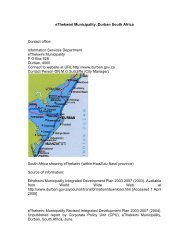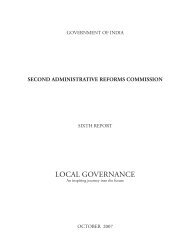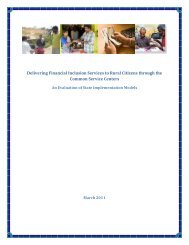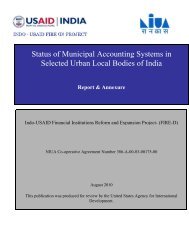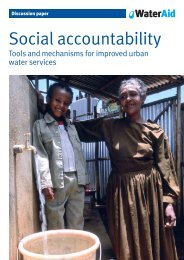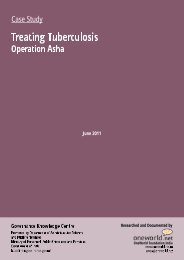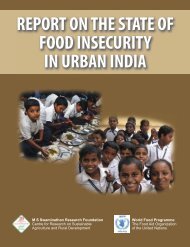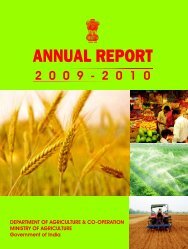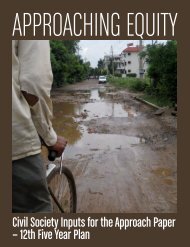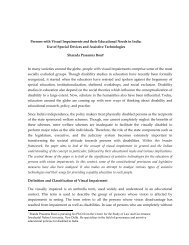Children educates community on sanitation - Governance in India
Children educates community on sanitation - Governance in India
Children educates community on sanitation - Governance in India
Create successful ePaper yourself
Turn your PDF publications into a flip-book with our unique Google optimized e-Paper software.
<str<strong>on</strong>g>Children</str<strong>on</strong>g> are tra<strong>in</strong>ed to test water us<strong>in</strong>g 12 parameters with water test<strong>in</strong>g kits provided. This is welldocumented by WES-Net <strong>India</strong> and the United Nati<strong>on</strong>s Team for Tsunami Recovery Support athttp://www.un.org.<strong>in</strong>/untrs/. For further details, you can c<strong>on</strong>tact Mr. Pieter, Executive Secretary. Email:real@md4.vsnl.net.<strong>in</strong>. You can also c<strong>on</strong>tact Ms. Lopamudra, Assistant Project Officer, UNICEF Office,Bhubaneswar for any assistance.Kash<strong>in</strong>ath Vajpai, TNS <strong>India</strong>, New DelhiThe official figure of sanitati<strong>on</strong> coverage <strong>in</strong> <strong>India</strong> has reached 45 per cent <strong>in</strong> 2007, whereas <strong>in</strong> 7 states itis over 70 per cent. The Government of <strong>India</strong>’s Total Sanitati<strong>on</strong> Campaign programme aims to cover allthe country’s <strong>on</strong>e milli<strong>on</strong> schools by 2007, as schools are well recognized and turn<strong>in</strong>g <strong>in</strong>to safe andhealthy places of learn<strong>in</strong>g about sanitati<strong>on</strong> and hygiene practices.The Total Sanitati<strong>on</strong> Campaign is am<strong>on</strong>g the eight flagship programme highlighted by the F<strong>in</strong>anceM<strong>in</strong>ister of <strong>India</strong> recently, with separate budgetary allocati<strong>on</strong>. The Rural Development M<strong>in</strong>ister of <strong>India</strong>also op<strong>in</strong>ed that sanitati<strong>on</strong> and safe dr<strong>in</strong>k<strong>in</strong>g water are ‘more important than the <strong>in</strong>crease <strong>in</strong> GDP orSensex’. Sanitati<strong>on</strong> promoti<strong>on</strong> and school sanitati<strong>on</strong> & hygiene educati<strong>on</strong> have been recognized asimportant developmental <strong>in</strong>dicators to the country by a number of nati<strong>on</strong>al and <strong>in</strong>ternati<strong>on</strong>al agencieswork<strong>in</strong>g <strong>in</strong> <strong>India</strong>.‘Sanitati<strong>on</strong> is more important than Independence’, was the important highlight of Nirmal Gram Puraskarcerem<strong>on</strong>y, that recently held <strong>in</strong> New Delhi. This speaks about the attempts made by 4959 awardw<strong>in</strong>n<strong>in</strong>g Gram Panchayat & Block Panchayat from 22 states of <strong>India</strong>. These Panchayat Raj Instituti<strong>on</strong>functi<strong>on</strong>aries also took a pledge about h<strong>on</strong>esty, transparency, clean and polluti<strong>on</strong> free envir<strong>on</strong>ment, andabout mak<strong>in</strong>g children go regularly to school.Tak<strong>in</strong>g stock from above, <strong>on</strong> the query <strong>on</strong> ‘role of children <strong>in</strong> spread<strong>in</strong>g water and sanitati<strong>on</strong>awareness’, I wish to reiterate that <strong>in</strong> general, the agencies work<strong>in</strong>g <strong>in</strong> different rural developmentissues are always try<strong>in</strong>g to re<strong>in</strong>vent the wheel rather replicat<strong>in</strong>g past successes. Rout<strong>in</strong>ely, most projectsare devised with a mandate to run ‘bus<strong>in</strong>ess as usual’. Therefore, the numbers of programme thatattempt to make a ‘breakthrough’ <strong>in</strong> sanitati<strong>on</strong> are very few, whereas the agencies work<strong>in</strong>g <strong>in</strong> thecountry <strong>on</strong> this issue are many.On the pretext of help<strong>in</strong>g local, regi<strong>on</strong>al and nati<strong>on</strong>al government <strong>in</strong> achiev<strong>in</strong>g the sanitati<strong>on</strong> ‘targets’,the formati<strong>on</strong> of ‘clubs’ (hygiene club, children club, mother’s club, etc.) and ‘groups’ (self help groups,watsan groups, sanitati<strong>on</strong> group, etc.), are am<strong>on</strong>g a few examples which are sometimes facilitated andrecorded <strong>in</strong> a number of projects. These are run & supported by agencies with a model and approachwhich they understand as ‘feasible’, rather mak<strong>in</strong>g it participatory (<strong>in</strong> a real sense). In my op<strong>in</strong>i<strong>on</strong>, thehigh adm<strong>in</strong>istrative costs (especially at the top level) must be observed closely to ensure availability ofmore funds/resources at operati<strong>on</strong>al level (programme implementati<strong>on</strong> level) and to cater to thesusta<strong>in</strong>ed need of implementer/field workers, etc. <strong>in</strong> the l<strong>on</strong>g run. The <strong>in</strong>stituti<strong>on</strong>alizati<strong>on</strong> of hygienepromoti<strong>on</strong> programme and l<strong>on</strong>g term commitment of agencies towards this cause is quite important.I differ to the comment <strong>on</strong> promoti<strong>on</strong> of ‘soil’ for safe hygiene practices. When we talk about behaviourchange, affordability to buy soap or to use local means (reetha seeds, ash, etc.) should never be abarrier (there are many examples of this). There are also a number of examples where children andwomen have been the motivat<strong>in</strong>g factor <strong>in</strong> behaviour change for the other members <strong>in</strong> a family.Hemalatha Patil, WaterAid <strong>in</strong>dia, Bangalore



